高中英语新人教版必修4 Unit 5 Theme parks Learning about Language构词法课件27张
文档属性
| 名称 | 高中英语新人教版必修4 Unit 5 Theme parks Learning about Language构词法课件27张 | 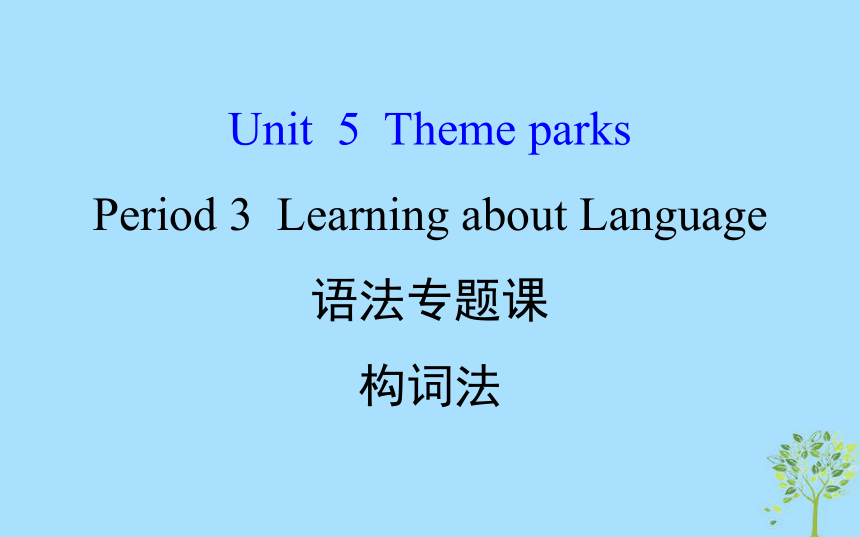 | |
| 格式 | zip | ||
| 文件大小 | 362.8KB | ||
| 资源类型 | 教案 | ||
| 版本资源 | 人教版(新课程标准) | ||
| 科目 | 英语 | ||
| 更新时间 | 2019-02-19 22:56:42 | ||
图片预览

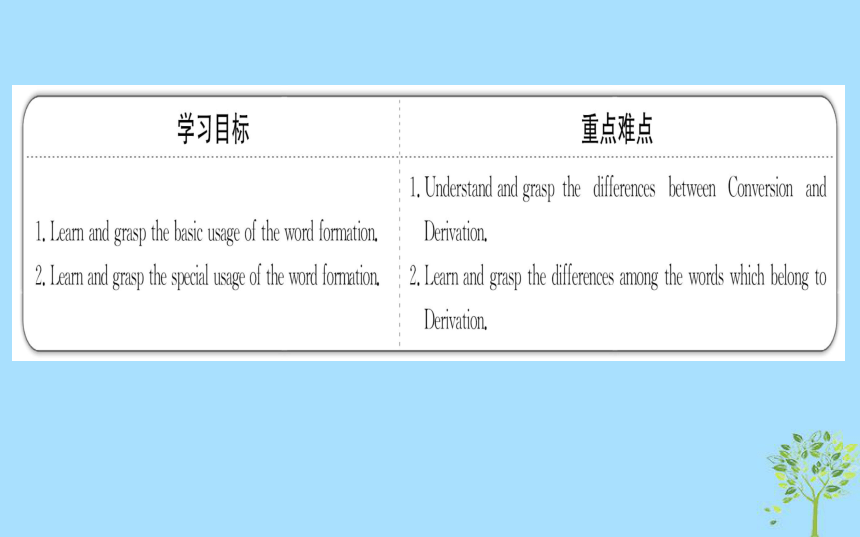

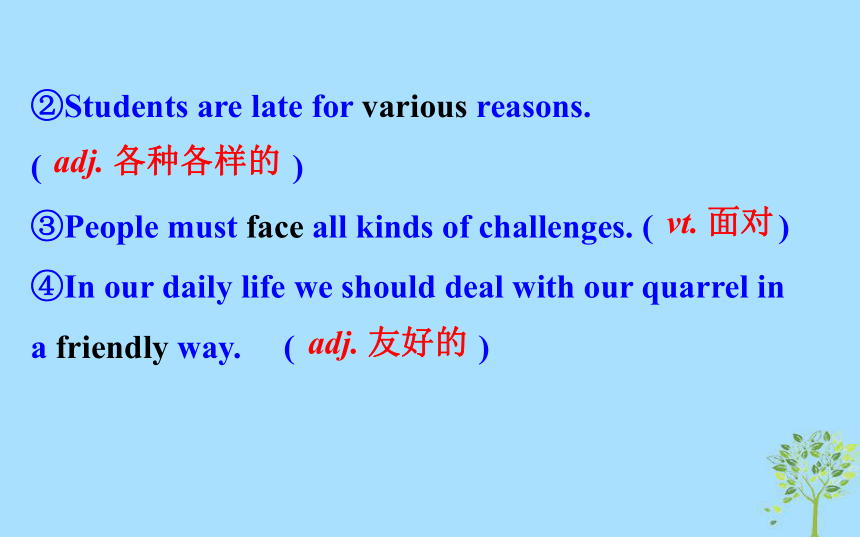
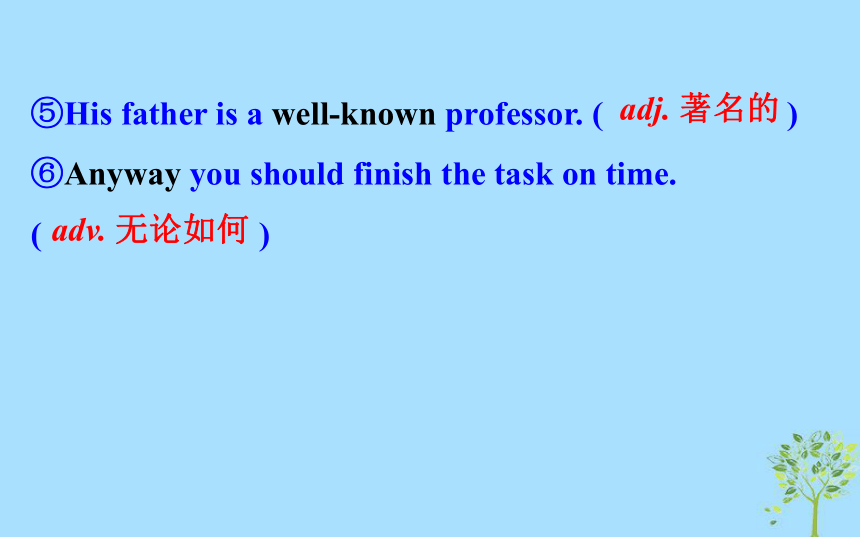



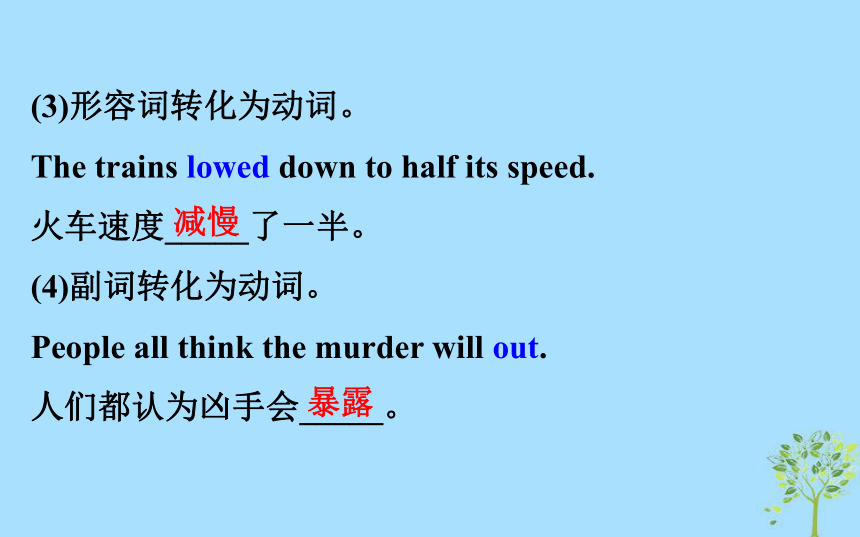
文档简介
课件27张PPT。Unit 5 Theme parks
Period 3 Learning about Language
语法专题课
构词法【课前热身】
朗读下列句子, 体会并写出黑体单词的词性和意义。
①We had to book the tickets because so many people
wanted to go home before the Spring Festival. ( )v. 预订②Students are late for various reasons.
( )
③People must face all kinds of challenges. ( )
④In our daily life we should deal with our quarrel in
a friendly way. ( )adj. 各种各样的vt. 面对adj. 友好的⑤His father is a well-known professor. ( )
⑥Anyway you should finish the task on time.
( )adj. 著名的adv. 无论如何【课堂诠解】
英语中的构词法主要有转化法、派生法、合成法、混合法等。其中转化法、派生法、合成法最为重要。
1. 转化法(conversion): 英语中, 一个单词由一种词性转化为另一种或几种词性而词形不变的方法叫转化法。单词转换后的意义往往与转化前的意义有密切联系, 大多数意义没有太大变化。词语的转化一般有以下几种情况: (1)动词转化为名词。
①Let’s go out for a walk. 我们到外面去_____吧。
②Let’s have a swim. 咱们去_____吧。散步游泳(2)名词转化为动词。
①She nursed her husband back to health.
她_____自己的丈夫恢复了健康。
②Did you book a seat on the plane?
你_____飞机座位了吗? 照顾订好(3)形容词转化为动词。
The trains lowed down to half its speed.
火车速度_____了一半。
(4)副词转化为动词。
People all think the murder will out.
人们都认为凶手会_____。减慢暴露(5)形容词转化为名词。
①He didn’t know the difference between right and
wrong.
他不辨_____。
②The old in our village are living a happy life.
我们村的_______过着幸福的生活。是非老年人2. 派生法(derivation): 在词根前面加前缀或在词根后面加后缀构成一个与原单词意义相近或截然相反的新词, 叫做派生法。(1)前缀: 除少数前缀外, 前缀一般改变单词的意义, 不
改变词性。
①表示否定意义的前缀常用的有: dis-, il-, im-, in-, mis-,
non-, un-等, 在单词的前面加这类前缀常常构成与该词
意义相反的新词。
Language differences can lead to poor communication,
________________ (understand) and even conflict.
语言的差异会导致交流困难、误解, 甚至冲突。misunderstanding②表示其他意义的前缀常用的有: a-(多构成表语形容
词), anti-(反对, 反抗), auto-(自动), co-(共同), en-(使),
re-(再, 又), sub-(下面的, 次), pre-(前, 预先), inter-(相
互), post-(后的)等。例如:
Doing exercises will _______(large)your vocabulary.
做这些练习将会扩展你的词汇。enlarge(2)后缀: 词根加后缀通常不改变词义, 只改变单词的词性。
①构成名词的后缀常用的有: -ence, -(e)r/or(从事某事的人); -ese(某地人), -ess(雌性), -ian(精通……的人), -ist(专业人员), -ment(性质, 状态), -tion(动作, 过程)等。例如: My teacher told me I needed ________(patient)in finishing the difficult task.
我的老师告诉我完成那项艰难的任务需要耐心。patience(2016·全国卷Ⅱ)Then, handle the most important tasks
first so you’ll feel a real sense of ___________ (achieve).
然后, 首先处理最重要的任务, 因此你会觉得有真正的
成就感。achievement②构成动词的后缀常用的有: -(e)n(多用于形容词之后), -fy(使……化), -ize(使……成为)。例如:
You should _______ (simple)the process.
你应当简化那个过程。simplify③构成形容词的后缀常用的有: -al, -able(有能力的),
-(a)n(某国人的), -en(多用于表示材料的名词后),
-ese(某国人的), -ous, -some, -y(表示天气)等。例如:
(2015·全国卷Ⅱ)As _______(nature)architects, the
Pueblo Indians figured out exactly how thick the adobe
walls needed to be to make the cycle work on most days.
作为天生的建筑师, 普韦布洛印第安人精确地指出了
使整个循环常年运转的土坯墙的厚度。natural④构成副词的后缀常用的有: -ly(主要用于形容词之后
表示方式或程度), -ward(s)(主要用于表示方位的词之
后表示方向)。例如:
(2016·全国卷Ⅰ)The title will be ________ (official)given
to me at a ceremony in London.
(大使)这个头衔将在伦敦的一个仪式上正式授予“我”。officially⑤构成数词的后缀有-teen(十几), -ty(几十), -th(构成序
数词)。例如:
This is the ______ (four)time that she has won the gold
medal.
这是她第四次获得金牌。fourth3. 合成法(compounding): 两个单词连在一起合成一个新词, 前一个词修饰或限定后一个词。(1)合成名词。(2)合成形容词。(3)合成动词。(4)合成代词。【课堂小结】
一、派生法:
在一个词的词根前面或后面加上某个词缀来生成一个与原单词意义相近或相反的新词, 这种构词法称为派生法。二、合成法:
把两个或两个以上的词合成一个新词, 这种构词法叫合成法, 由合成法构成的单词叫合成词(Compound words)。
三、转化法:
在词形不变的情况下, 一个单词由一种词性转化为另一种词性, 这种构词法称为转化法。
Period 3 Learning about Language
语法专题课
构词法【课前热身】
朗读下列句子, 体会并写出黑体单词的词性和意义。
①We had to book the tickets because so many people
wanted to go home before the Spring Festival. ( )v. 预订②Students are late for various reasons.
( )
③People must face all kinds of challenges. ( )
④In our daily life we should deal with our quarrel in
a friendly way. ( )adj. 各种各样的vt. 面对adj. 友好的⑤His father is a well-known professor. ( )
⑥Anyway you should finish the task on time.
( )adj. 著名的adv. 无论如何【课堂诠解】
英语中的构词法主要有转化法、派生法、合成法、混合法等。其中转化法、派生法、合成法最为重要。
1. 转化法(conversion): 英语中, 一个单词由一种词性转化为另一种或几种词性而词形不变的方法叫转化法。单词转换后的意义往往与转化前的意义有密切联系, 大多数意义没有太大变化。词语的转化一般有以下几种情况: (1)动词转化为名词。
①Let’s go out for a walk. 我们到外面去_____吧。
②Let’s have a swim. 咱们去_____吧。散步游泳(2)名词转化为动词。
①She nursed her husband back to health.
她_____自己的丈夫恢复了健康。
②Did you book a seat on the plane?
你_____飞机座位了吗? 照顾订好(3)形容词转化为动词。
The trains lowed down to half its speed.
火车速度_____了一半。
(4)副词转化为动词。
People all think the murder will out.
人们都认为凶手会_____。减慢暴露(5)形容词转化为名词。
①He didn’t know the difference between right and
wrong.
他不辨_____。
②The old in our village are living a happy life.
我们村的_______过着幸福的生活。是非老年人2. 派生法(derivation): 在词根前面加前缀或在词根后面加后缀构成一个与原单词意义相近或截然相反的新词, 叫做派生法。(1)前缀: 除少数前缀外, 前缀一般改变单词的意义, 不
改变词性。
①表示否定意义的前缀常用的有: dis-, il-, im-, in-, mis-,
non-, un-等, 在单词的前面加这类前缀常常构成与该词
意义相反的新词。
Language differences can lead to poor communication,
________________ (understand) and even conflict.
语言的差异会导致交流困难、误解, 甚至冲突。misunderstanding②表示其他意义的前缀常用的有: a-(多构成表语形容
词), anti-(反对, 反抗), auto-(自动), co-(共同), en-(使),
re-(再, 又), sub-(下面的, 次), pre-(前, 预先), inter-(相
互), post-(后的)等。例如:
Doing exercises will _______(large)your vocabulary.
做这些练习将会扩展你的词汇。enlarge(2)后缀: 词根加后缀通常不改变词义, 只改变单词的词性。
①构成名词的后缀常用的有: -ence, -(e)r/or(从事某事的人); -ese(某地人), -ess(雌性), -ian(精通……的人), -ist(专业人员), -ment(性质, 状态), -tion(动作, 过程)等。例如: My teacher told me I needed ________(patient)in finishing the difficult task.
我的老师告诉我完成那项艰难的任务需要耐心。patience(2016·全国卷Ⅱ)Then, handle the most important tasks
first so you’ll feel a real sense of ___________ (achieve).
然后, 首先处理最重要的任务, 因此你会觉得有真正的
成就感。achievement②构成动词的后缀常用的有: -(e)n(多用于形容词之后), -fy(使……化), -ize(使……成为)。例如:
You should _______ (simple)the process.
你应当简化那个过程。simplify③构成形容词的后缀常用的有: -al, -able(有能力的),
-(a)n(某国人的), -en(多用于表示材料的名词后),
-ese(某国人的), -ous, -some, -y(表示天气)等。例如:
(2015·全国卷Ⅱ)As _______(nature)architects, the
Pueblo Indians figured out exactly how thick the adobe
walls needed to be to make the cycle work on most days.
作为天生的建筑师, 普韦布洛印第安人精确地指出了
使整个循环常年运转的土坯墙的厚度。natural④构成副词的后缀常用的有: -ly(主要用于形容词之后
表示方式或程度), -ward(s)(主要用于表示方位的词之
后表示方向)。例如:
(2016·全国卷Ⅰ)The title will be ________ (official)given
to me at a ceremony in London.
(大使)这个头衔将在伦敦的一个仪式上正式授予“我”。officially⑤构成数词的后缀有-teen(十几), -ty(几十), -th(构成序
数词)。例如:
This is the ______ (four)time that she has won the gold
medal.
这是她第四次获得金牌。fourth3. 合成法(compounding): 两个单词连在一起合成一个新词, 前一个词修饰或限定后一个词。(1)合成名词。(2)合成形容词。(3)合成动词。(4)合成代词。【课堂小结】
一、派生法:
在一个词的词根前面或后面加上某个词缀来生成一个与原单词意义相近或相反的新词, 这种构词法称为派生法。二、合成法:
把两个或两个以上的词合成一个新词, 这种构词法叫合成法, 由合成法构成的单词叫合成词(Compound words)。
三、转化法:
在词形不变的情况下, 一个单词由一种词性转化为另一种词性, 这种构词法称为转化法。
同课章节目录
